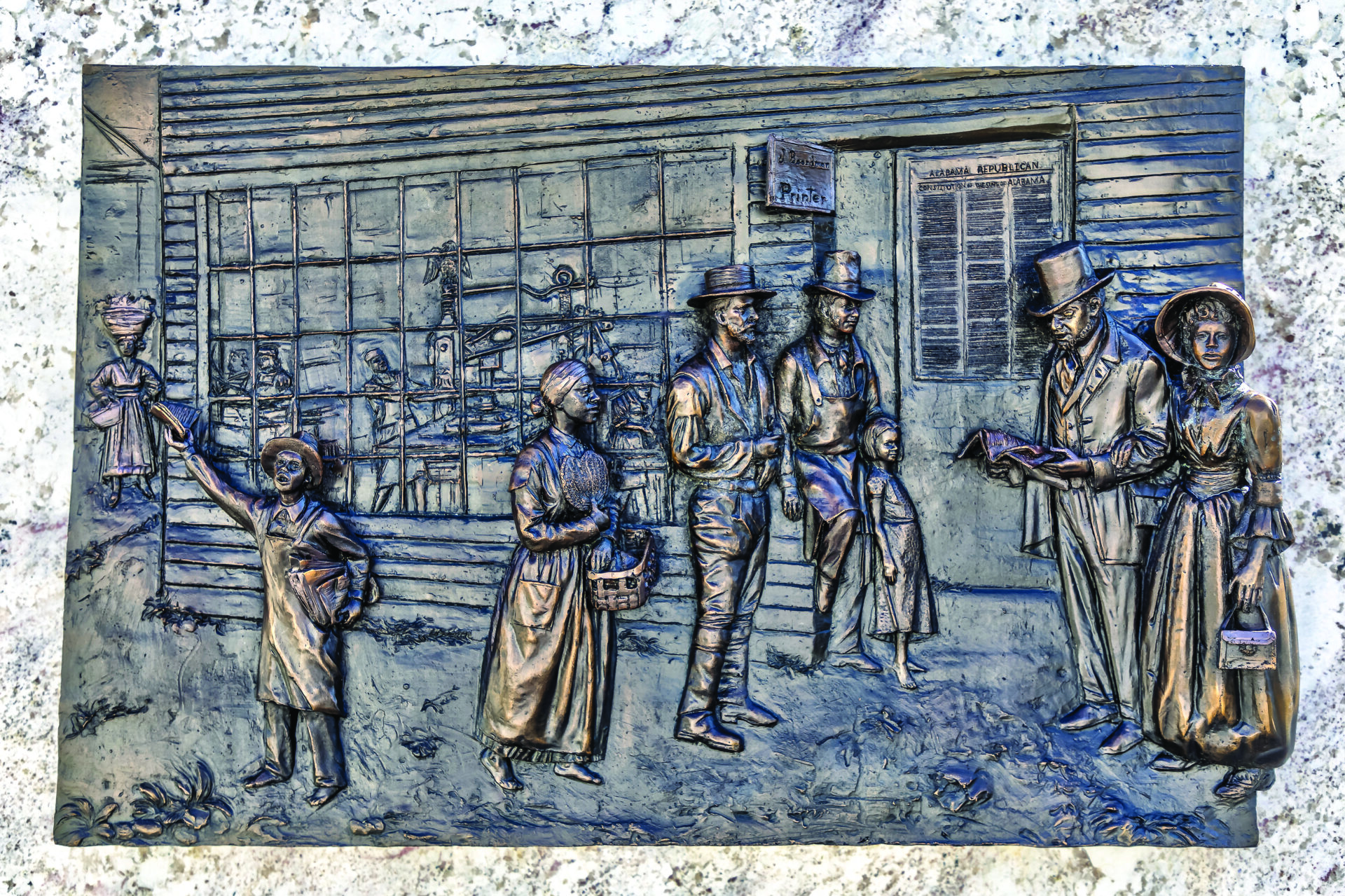
This story appears in the March 2021 issue of Business Alabama magazine.
When delegates arrived in Huntsville in the summer of 1819 to write Alabama’s first constitution, there was an unlikely scribe in their midst. At age 28, John Boardman was a man in a hurry. Through a combination of lobbying, business acumen and some frontier luck, he secured a place in Alabama history as the man charged with printing the governing document of the new state.
Born in Oneida County, New York, in 1791, Boardman and his elder brother Elijah arrived in the Alabama Territory in 1818, enticed like so many others by cheap land and vast business prospects. Elijah Boardman purchased several tracts of land in Madison County and established a plantation called Boardman’s Mills.
The younger Boardman brother followed a more circuitous route through early Alabama. In February 1818, he became one of the first men licensed to practice law in the territory. He settled first in Cotaco County (now called Morgan County). Territorial Governor William Wyatt Bibb appointed the young attorney as county clerk. But the levers of government turn slowly, particularly in flush times. Word of his appointment reached Boardman after he had already left Cotaco County, bound for a new venture in nearby Huntsville.

The place where John Boardman took up residence was of great economic and political importance. First settled in 1805, Huntsville was the largest town in the Alabama Territory. By 1815, there were more than 250 structures in the town, many of them made of brick. Huntsville boasted five cotton gins, which were kept busy by the surrounding fertile farmland.
When the U.S. Congress set in motion Alabama’s path to statehood, members picked Huntsville for its temporary seat of government and first constitutional convention.
Although he had no prior experience as a member of the Fourth Estate, Boardman entered the newspaper business upon his arrival in Huntsville. In April 1818, he partnered with Thomas B. Grantland, publisher of the Alabama Republican, one of several Madison County weeklies. Soon, Boardman was made editor of the paper, and by November 1818, became the Republican’s sole proprietor. From a well-appointed complex in the heart of the bustling town, he ran his successful newspaper, a law office and one of the territory’s first lending libraries. In short order, John Boardman made his mark on Huntsville.

Boardman had powerful allies as well. In December 1818, Charles Tait, the former U.S. senator from Georgia who helped ensure Alabama’s statehood, wrote to Secretary of State John Quincy Adams and recommended Boardman as the official publisher of the territorial laws of Alabama and other items of vital interest to the legal profession. Adams agreed. His designation as a trusted printer of the law made Boardman a logical choice to typeset Alabama’s first constitution and the official proceedings when the convention began on July 5, 1819. The following day, delegates voted to provide Boardman with a seat at the convention. He was the only journalist allowed to view the deliberations, which were held in a cramped room above a cabinetmaker’s shop.
The framers of Alabama’s constitution completed their work on Aug. 2, 1819. A clerk prepared a handwritten copy of the document for submission to the Congress, one of the final acts required to ensure statehood. The task of printing the document for the rest of the world to read fell to John Boardman and his printing press. True to his word, he offered loyal readers of the Alabama Republican the first chance to read the document. On Aug. 5, 1819, he published the full text on the pages of his newspaper.
Boardman printed 1,004 copies of the new constitution and was paid $55.50 for the work, which would be around $1,000 today. Few original copies survive. Of the new governing document, he offered this learned editorial view: “Although it does not entirely meet our wishes, we believe it is the best that could be obtained…. We can rejoice with, and congratulate the citizens of the state of Alabama, that the fundamental principles of the Constitution were not adopted with rash precipitancy, but are founded in wisdom, and well calculated to ensure the permanent happiness and prosperity of the State.”

In 1824, Boardman sold the Republican to pursue other opportunities. He served on the board of trustees, which governed prosperous Huntsville, and was twice elected as its president. In 1827, the state legislature appointed him to the board of directors for the newly created Muscle Shoals Canal Co., charged with overseeing a project that would ensure a navigable river route from New Orleans to east Tennessee. The position placed him alongside north Alabama notables including Nicholas Davis, John Coffee and Clement C. Clay, who would later serve as governor of Alabama from 1835 to 1837.
The Panic of 1837 proved ruinous for John Boardman. In addition to the loss of his own fortune, the panic wiped out a substantial investment of more than $30,000 entrusted to his care by a Connecticut school for deaf children (his younger sister was a graduate). Boardman’s former rival editors in north Alabama augmented his failure in their newspapers. Soon thereafter, he departed for France seeking rest and another new beginning.
After a few years in exile, Boardman returned to America and settled in Mississippi, where he oversaw some of Elijah Boardman’s business interests. John Boardman died near Holly Springs, Mississippi, on November 16, 1844.
Although few in Huntsville marked his death, Boardman’s contribution to Alabama’s path to statehood lives on in two places. A recreated version of his home and printing press is featured at Alabama Constitution Hall Historic Park and Museum in Huntsville. One of the bronze sculptures in Alabama Bicentennial Park, dedicated in 2019 at the capitol to commemorate statehood, depicts a group of Alabamians standing in front of Boardman’s office reading their constitution for the first time.
See Alabama’s first constitution here.



